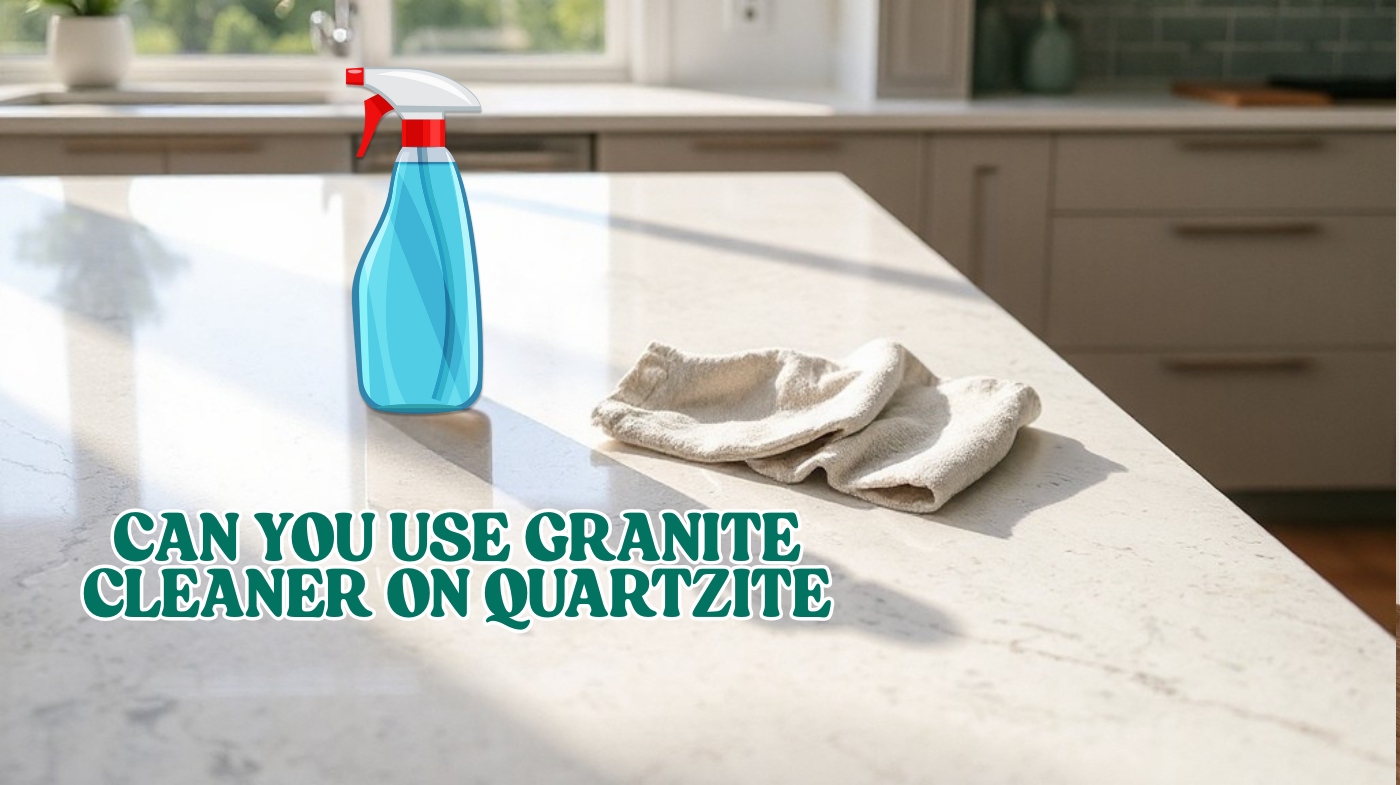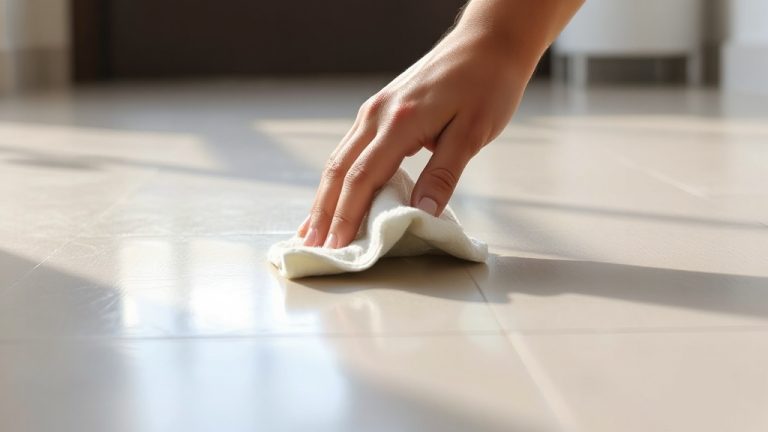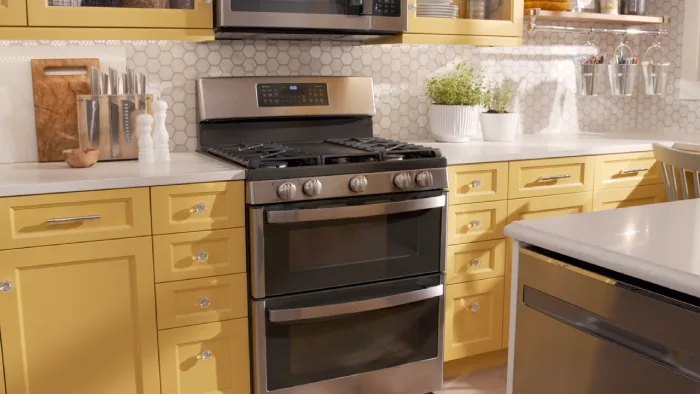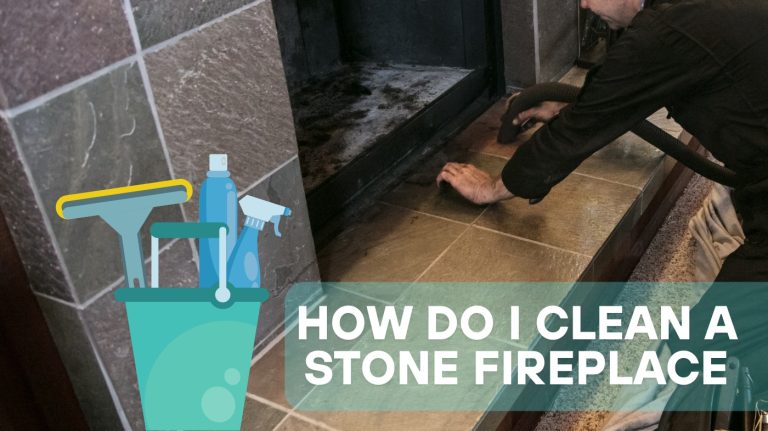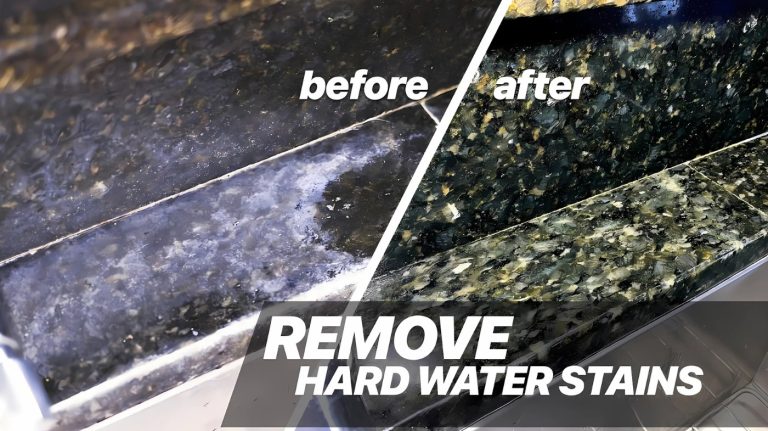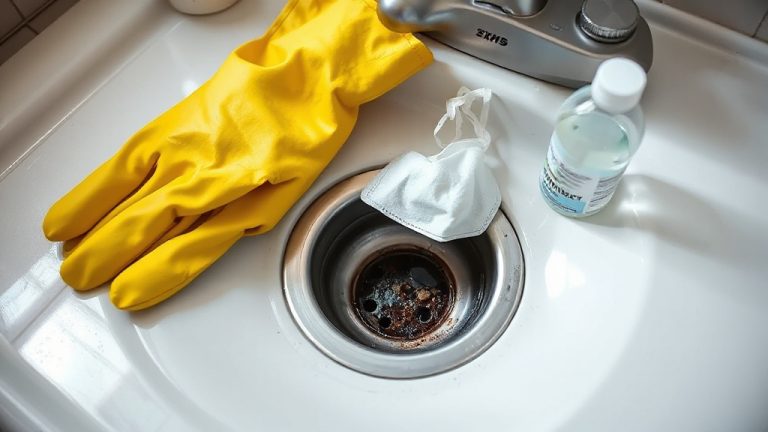Can You Use Granite Cleaner on Quartzite? Things to Know
You shouldn’t use granite cleaner on quartzite because it can harm the stone’s protective sealant, causing discoloration and reducing its durability.
Granite cleaners often have different pH levels and ingredients that may react poorly with quartzite’s surface. To keep your quartzite looking its best, use pH-neutral, non-abrasive cleaners designed specifically for natural stone.
Avoid harsh chemicals to maintain its natural beauty and long-lasting finish. Discover more about safely caring for your quartzite countertops to preserve their quality.
Key Takeaways
- Granite cleaner is generally pH-neutral but may not suit quartzite’s slightly alkaline cleaning needs.
- Using granite cleaner on quartzite can damage its sealant, causing discoloration and increased stain risk.
- Harsh chemicals or abrasives in granite cleaners can dull quartzite’s natural luster and cause surface damage.
- Quartzite requires gentle, pH-balanced cleaners like mild soap and water or specialized quartzite products.
- For long-term care, use cleaners formulated specifically for quartzite to maintain its durability and appearance.
Quartzite and Granite Surfaces
When choosing between quartzite and granite for your surfaces, understanding their composition and characteristics is essential.
Quartzite consists mainly of quartz (silicon dioxide), giving it a hardness of about 7 on the Mohs scale, which makes it highly durable and resistant to abrasion.
Its coarse-grained texture features an interlocking pattern of quartz crystals, and it appears in colors like white, gray, pink, yellow, or green. Quartzite is also valued for its durability and stain-resistance when properly sealed.
Quartzite’s high quartz content gives it exceptional durability and a distinctive interlocking crystal texture.
Granite, on the other hand, is a complex mix of quartz, feldspar, and mica, with variable hardness depending on its mineral makeup.
It also has a coarse-grained texture, showcasing visible mineral crystals, and comes in diverse colors such as black, white, gray, and pink.
Both materials are durable and widely used for countertops and surfaces where longevity and aesthetics matter.
Chemical Differences Between Granite and Quartzite Cleaners
You’ll notice that granite and quartzite cleaners differ primarily in pH levels, with quartzite formulas often leaning slightly more alkaline to protect the denser stone.
Abrasive content also varies, as quartzite cleaners use gentler ingredients to avoid scratching, unlike some granite cleaners. These chemical formulation differences guarantee each cleaner suits the unique properties of its respective stone.
Additionally, quartzite is harder than granite, which influences the formulation of cleaners to ensure effective yet safe maintenance of the hardness difference.
Ph Levels Comparison
Although granite and quartzite both require careful cleaning, their differing chemical compositions mean their pH tolerances vary considerably.
Granite cleaners are typically pH-neutral, safe for most stone surfaces but sometimes too harsh for quartzite. Quartzite demands low pH, non-acidic cleaners to prevent surface damage.
You should always check manufacturer guidelines before choosing a cleaner. Additionally, quartzite’s sensitivity to harsh chemicals means that many granite cleaners, which may contain abrasives or unsuitable pH levels, can damage its surface if used improperly, so selecting a compatible cleaner is crucial.
| Stone Type | Cleaner pH Level | Sensitivity to pH | Recommended Cleaner Type | Risk of Damage if Incorrect pH Used |
|---|---|---|---|---|
| Granite | Neutral (~7) | Moderate | pH-neutral | Low |
| Quartzite | Low, non-acidic | High | Mild, non-acidic | High |
Using the wrong pH cleaner on quartzite can cause etching or dulling, so choose carefully.
Abrasive Content Differences
Since granite cleaners often contain abrasives designed to remove tough stains, using them on quartzite can cause surface damage.
Quartzite’s mineral composition makes it more sensitive to abrasives, which can result in visible scratches and dullness. To protect your quartzite surfaces, you need cleaners specifically formulated without abrasives.
Here’s why abrasive content matters:
- Granite cleaners include abrasive particles to tackle stubborn grime effectively.
- Quartzite cleaners avoid abrasives to prevent scratching and preserve surface integrity.
- Using abrasive granite cleaners on quartzite can lead to permanent surface damage and reduce durability.
Many specialized granite cleaners are pH balanced and designed to safely clean without streaks, but these formulas may not be suitable for quartzite.
When cleaning quartzite, choose non-abrasive products to maintain its natural beauty and extend its lifespan. Avoid abrasive granite cleaners to guarantee your quartzite stays flawless.
Chemical Formulation Variances
When selecting a cleaner for quartzite, you need to contemplate chemical formulation differences that affect how the stone reacts.
Quartzite often contains resin or epoxy fillers that may discolor over time, especially when exposed to UV light.
Its lower porosity means it requires less frequent sealing compared to granite, but both stones benefit from pH-neutral cleaners to prevent surface damage and sealer breakdown.
While granite and quartzite share good stain resistance, quartzite’s density offers added protection. Additionally, both granite and quartzite are porous, allowing for liquid absorption and necessitating the use of impregnating sealers.
You should avoid harsh chemicals, opting instead for mild soap solutions or specialized stone cleaners designed to maintain the integrity of both surfaces.
Potential Risks of Using Granite Cleaner on Quartzite
If you use granite cleaner on quartzite, you risk damaging its delicate sealant and surface. Granite cleaners often contain chemicals that aren’t formulated for quartzite’s unique composition, which can degrade the protective seal and compromise its durability.
Since quartzite is a natural stone with a sealant that differs from granite’s, using a product not tailored for it can accelerate wear.
Sealant requirements This damage increases porosity, making your quartzite more susceptible to stains and discoloration. Additionally, harsh or improperly balanced cleaners can leave streaks, dull the finish, or even cause surface scratches.
Using granite cleaner on quartzite can damage its sealant and surface, risking durability and appearance.
Consider these potential risks:
- Sealant breakdown leading to quicker resealing and increased staining.
- Surface discoloration or uneven color caused by chemical reactions.
- Loss of quartzite’s natural luster due to residue or abrasive elements.
To protect your quartzite, avoid granite cleaners that aren’t specifically designed for its care.
Recommended Cleaning Solutions for Quartzite
Although quartzite is a durable natural stone, choosing the right cleaning solutions is essential to preserve its appearance and integrity.
Quartzite is a hard and dense stone that combines the beauty of marble with the durability of granite, making proper care crucial.
You should use pH-neutral, non-abrasive products like mild soap and water or specialized stone cleaners such as DuPont StoneTech or Weiman Disinfecting Granite & Stone Cleaner.
Avoid harsh chemicals containing ammonia or bleach. For stubborn stains, a baking soda poultice works effectively.
| Cleaning Solution | Use Case | Key Benefit |
|---|---|---|
| Mild Soap and Water | Daily cleaning | pH-balanced |
| DuPont StoneTech Cleaner | Routine maintenance | pH-neutral formula |
| Baking Soda Poultice | Stubborn stains removal | Gentle, effective |
Selecting proper cleaners helps maintain your quartzite’s natural beauty and longevity.
How to Safely Clean Quartzite Countertops?
Because quartzite countertops combine beauty with durability, you’ll want to clean them carefully to maintain their pristine condition.
Quartzite countertops marry elegance with strength, requiring gentle care to keep their flawless look intact.
Start by clearing the surface of all items and dusting with a soft microfiber cloth to remove loose particles. Use a mild soap or specialized quartzite cleaner on a damp cloth, wiping gently in circular motions to avoid damage.
Finally, dry the surface thoroughly to prevent water spots. It is important to use a low pH non-acidic cleaner such as dishwashing soap and warm water for best results.
Follow these steps for safe cleaning:
- Remove debris and dust with a soft, dry cloth.
- Apply a mild, pH-balanced cleaner using gentle circular wiping.
- Dry completely with a clean cloth, paying special attention to edges and corners.
Avoid harsh chemicals and abrasive tools to preserve your quartzite’s natural beauty.
Characteristics of Ideal Cleaners for Quartzite
Maintaining quartzite countertops requires more than just gentle cleaning techniques; selecting the right cleaner plays a significant role in preserving their appearance and durability.
You should always choose pH-neutral cleaners to avoid etching or surface damage. Avoid acidic substances like vinegar or lemon, as well as harsh chemicals such as bleach and concentrated ammonia.
Since quartzite is a natural stone similar in care requirements to quartz, it is important to use cleaners that do not contain abrasives or harsh acids to protect the surface’s integrity.
Since quartzite is highly heat resistant, it is important to still protect the surface by avoiding harsh chemical exposure that could degrade its natural strength. This natural stone’s durability and heat resistance make it an excellent choice for countertops.
Opt for non-abrasive formulas free of scouring powders or abrasive tools to prevent scratching. Cleaners designed specifically for natural stone are your best bet, ensuring compatibility and safety.
Using soft cloths rather than abrasive pads helps maintain the polished finish without causing micro-scratches.
While some granite cleaners may work, verify they’re pH-neutral and chemical-free. For daily cleaning, mild dish soap or specialized stone cleaners with soft cloths work well.
Tips for Maintaining Quartzite’s Appearance and Durability
When you care for quartzite regularly, you preserve its natural beauty and extend its durability. Consistent cleaning and protective measures are essential to maintain this elegant stone’s appearance.
To keep your quartzite looking its best, follow these tips:
- Clean daily with a soft cloth and mild detergent, avoiding abrasives that can scratch or dull the surface. Wipe spills immediately to prevent moisture damage. Quartzite is harder than glass and knife blades, making it resistant to scratches.
- Use cutting boards, trivets, and coasters to protect against scratches, heat, and stains. Regularly inspect for wear and apply a food-safe stone sealant at least once a year.
- Address stains promptly with appropriate poultices or baking soda paste, and avoid acidic cleaners that can harm the sealant. Sealing enhances stain resistance and may be necessary depending on the stone’s porosity.
Frequently Asked Questions
Can Granite Cleaner Remove Tough Stains on Quartzite?
Granite cleaner mightn’t effectively remove tough stains on quartzite because it often contains abrasives or pH levels that could harm the surface.
You should use low pH, non-acidic cleaners specifically designed for quartzite to avoid damage. For stubborn stains, gentle cleaning combined with patience is key.
Always test cleaners on a small area first, and if stains persist, consider consulting a professional to protect your quartzite’s appearance and longevity.
Is It Safe to Use Granite Cleaner on Sealed Quartzite?
You shouldn’t use granite cleaner on sealed quartzite because many contain abrasives or have a pH imbalance that can damage the seal or surface.
Instead, stick to mild dish soap or pH-neutral cleaners, which protect the seal and keep your quartzite looking its best.
Always check cleaning product labels and avoid citrus or harsh chemicals to maintain your countertop’s longevity and prevent voiding any warranties.
How Often Should Quartzite Countertops Be Resealed?
You should reseal your quartzite countertops every 6 months to 3 years, depending on usage and the sealant’s quality.
If your countertops see heavy use, especially in kitchens, resealing more frequently helps protect against stains and wear.
Perform a water test—if water soaks in instead of beading up, it’s time to reseal. Regular cleaning and using high-quality sealants also extend the seal’s effectiveness and lifespan.
Can Granite Cleaner Affect Quartzite’S Natural Shine?
Shining surfaces suffer setbacks when unsuitable solutions seep in. Yes, granite cleaners can affect quartzite’s natural shine by dulling its distinctive luster. These cleaners often contain harsh chemicals or improper pH levels that may damage quartzite’s sealant and surface.
To safeguard your stone’s sparkle, always opt for pH-balanced, gentle cleaners specifically designed for quartzite, and test any product on a hidden spot before applying it broadly.
Are There Eco-Friendly Granite Cleaners Safe for Quartzite?
Yes, you can find eco-friendly granite cleaners safe for quartzite, but you need to choose carefully. Look for products that are pH-neutral, non-abrasive, and USDA Bio-Based certified to guarantee they won’t harm your quartzite’s surface.
Always check if the cleaner is labeled safe for multiple stone types, including quartzite. Following manufacturer recommendations will help you maintain your stone’s natural beauty without risking damage or discoloration.
Treat Quartzite Right: Clean Smart, Shine Longer
Just like you wouldn’t use a key for the wrong lock, applying granite cleaner to quartzite can cause unwanted damage. Quartzite demands gentle, pH-balanced cleaners designed specifically for its unique composition.
To keep your countertops looking pristine and durable, always choose products made for quartzite and follow safe cleaning practices. Treat your surfaces with the care they deserve, and you’ll enjoy their natural beauty for years to come.

